Reviews of "Thirteen Lives," "Emily the Criminal" and "Queen of Glory" are all in the latest Movies with Meaning post on the web site of The Good Media Network, available by clicking here.
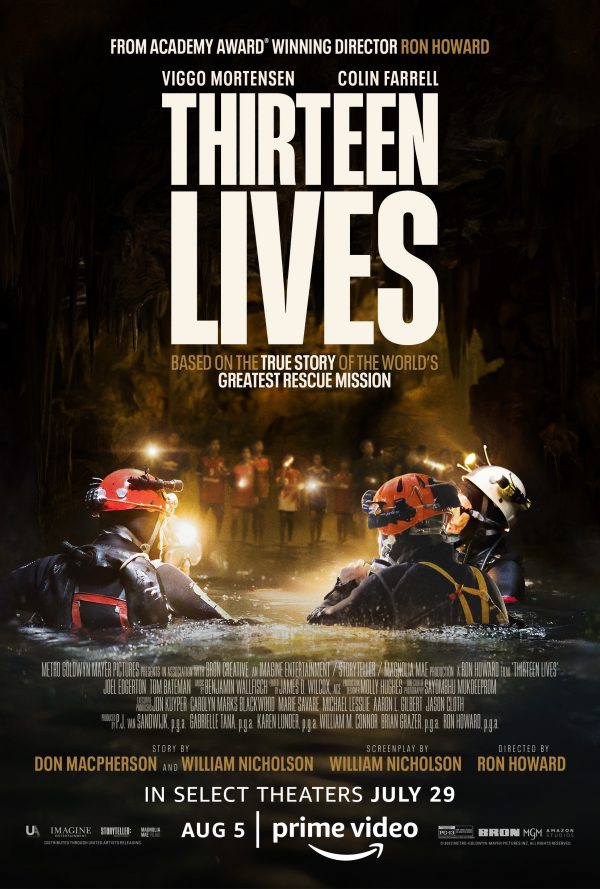
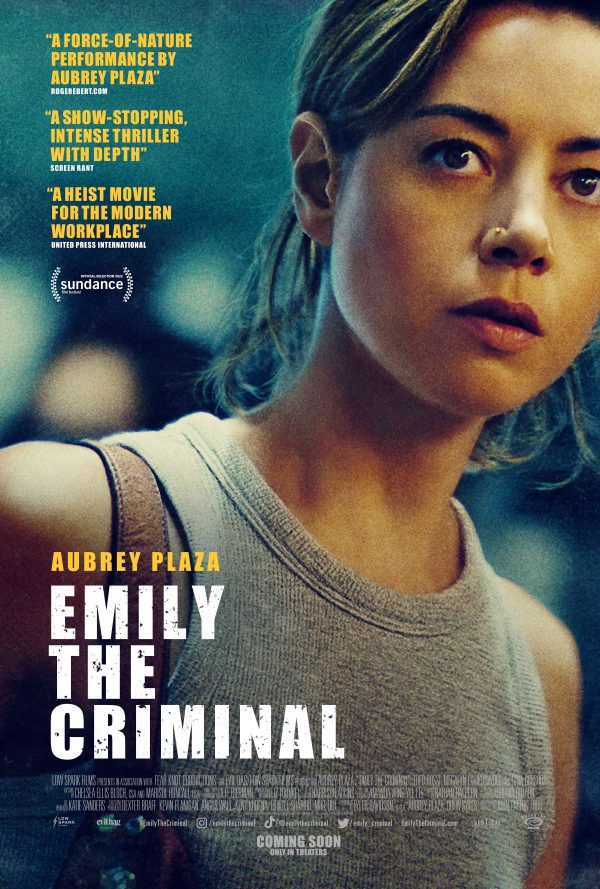
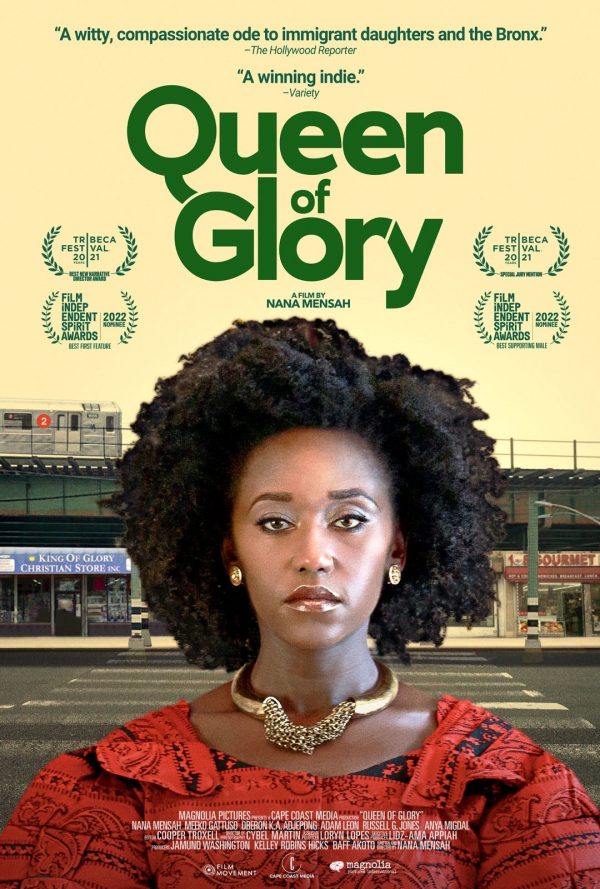

Reviews of "Thirteen Lives," "Emily the Criminal" and "Queen of Glory" are all in the latest Movies with Meaning post on the web site of The Good Media Network, available by clicking here.





“Queen of Glory” (2021 production, 2022 release). Cast: Nana Mensah, Meeko Gattuso, Oberon K.A. Adjepong, Adam Leon, Russell G. Jones, Tanya Migdal, Anya Migdal, Alice Lebedev-Migdal, Ian Lassiter, Christie Mensah, Jennifer Mensah, Emma Kaye. Director: Nana Mensah. Screenplay: Nana Mensah. Web site. Trailer.
Life’s rough patches can be agonizing, frustrating and difficult, challenges that seemingly take us far afield from where we want to be. We often can’t help but wonder what’s behind such detours, especially when they appear to blatantly run counter to our hopes, wishes and dreams. What good purpose could they possibly serve? But, when we take the time and effort to explore them, we may find some hidden nuggets of wisdom and insight buried deeply within them. Such is the lot of a self-determined young woman struggling to sort out her life in a time of transition in the delightfully wacky new dark comedy-drama, “Queen of Glory.”
Sarah Obeng (Nana Mensah) is trying to outrun her past. As the US-born daughter of immigrants from Ghana, she’s spent her life trying to tactfully escape her background and become a modern American woman. She doesn’t openly disrespect her heritage, but she’s looking for something different for herself than what most of her family members want for themselves – or her. Still, despite her independent streak, Sarah is nevertheless routinely subjected to the loving but firm nudges of her relatives to steer her in the traditional direction that they genuinely believe is the only right course – and that she shouldn’t even be questioning.
In many regards, Sarah’s story is typical of what first generation American-born children of immigrant parents experience as they seek to find their way in life. Having grown up in the Pelham Parkway section of the Bronx, a predominantly middle class, blue collar neighborhood that serves as home to an array of immigrants of African, Latin and eastern European ancestry, she’s purposely distanced herself from her cultural background. This shift is apparent in her work, values and lifestyle. For example, she’s largely abandoned the fundamentalist African Christian religious beliefs of her upbringing in favor of a more contemporary perspective, a change that has prompted her to shed more conventional notions that she’s come to see as quaint, outmoded and out of step. That decidedly different approach to life is reflected in many regards, even her choice of career, having chosen to follow a science-oriented path as a neuro-oncology doctoral candidate at Columbia University.
But the differences don’t end there. In addition to moving out of her childhood neighborhood, Sarah’s quietly been dating one of her grad student colleagues, Lyle Cummins (Adam Leon). As a married Caucasian man, he’s probably not what her family would expect – or approve of – as marriage material for Sarah, but she’s committed to pursuing the relationship, especially when he assures her that he’s planning to divorce his wife and resettle in Ohio. Availing herself of that added distance has considerable appeal for Sarah, as it will physically remove her even further from her past and give her the freedom to become the individual she wants to be.
As events progress, it seems Sarah is moving ever closer to fulfilling her dream. But that all changes when her mother, Grace, unexpectedly passes away. Sarah is suddenly thrust into a new set of responsibilities. She needs to make funeral arrangements and settle her mother’s estate, which includes selling her home and figuring out what to do with her mom’s business, a Christian bookstore called King of Glory.

Even though these developments take Sarah back into her old neighborhood and culture, she feels out of place. She’s been removed from these circumstances for so long that they seem strange to her. What’s more, she’s suddenly being required to handle tasks she’s never done before – planning a funeral, selling a house, and operating a business whose merchandise and marketing are totally foreign to her and her sensibilities. And, on top of all that, her plans for the future have been seriously derailed, leaving her up in the air.
Under circumstances like this, one might think Sarah’s story would be utterly bleak and devastating. However, given that she now finds herself ensconced in a proverbial fish-out-of-water scenario, she’s beset by an array of outlandish – and genuinely funny – situations. Her attempts at coping might not make her laugh, but they’re guaranteed to do so for viewers, especially as matters become further complicated by additional new developments.
Sarah’s plans for tackling these tasks reflect what she sees as her rational contemporary sensibilities, actions that she assumes others should naturally agree with. For instance, when it comes to funeral arrangements, Sarah looks to arrange a simple wake in her mother’s home, one that resembles a subdued cocktail party more than anything of a funerary nature. However, her family members and mother’s friends see this as insufficient and insist on a more customary Ghanaian ceremony, an event characterized by elaborate rituals, extravagant “costuming,” and a massive spread of food, including many traditionally prepared dishes. It’s all new – and somewhat eye-opening – for Sarah, especially when she goes “grocery shopping” at a livestock market to buy “ingredients” that bring new meaning to the term “fresh.”
Then there’s the matter of selling Grace’s house, which Sarah goes about matter-of-factly, hoping that she can expedite the process to keep it from interfering with her moving plans to the Midwest. But that goes awry when her estranged father, Godwin (Oberon K.A. Adjepong), returns to New York from Ghana after a long absence. He sees the property as something that belongs in the family, even though his wife is no longer living there and the fact that he hasn’t done so in years. And, when Sarah protests, Godwin doesn’t hesitate to call upon his strong-arm patriarchal attitude to make his feelings indisputably known. Sarah sees this as yet another frustrating delay to keep her from moving on with her plans, not to mention the fact that it does nothing to smooth over relations with dad at a time when some parental support could probably do a world of good for her.
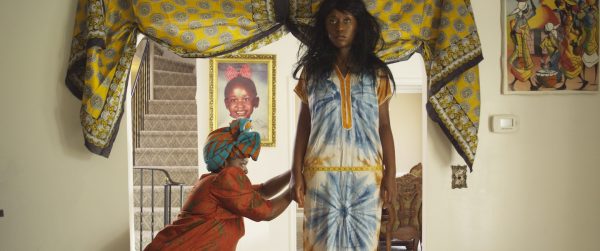
But perhaps the biggest challenge Sarah faces is deciding what to do about the business. She has no interest in holding on to it, given that it holds no appeal for her. She sees its merchandise and mission as simplistic and corny, clearly running afoul of her secular worldview. But what is she to do with it? She also must deal with her mother’s right-hand man, Pitt (Meeko Gattuso), an ex-con festooned in a plethora of tattoos who dabbles in making pastries laced with special ingredients and drops less-than-subtle hints that he’d like to take over the business. Sarah is somewhat puzzled by his interest in the bookstore, sensing that he doesn’t seem like the type to run an operation like this. But he recognizes the role it – and he – plays in fulfilling the needs of the neighborhood, whether it’s for religious greeting cards or specialty baked goods.
As all of these challenges unfold, Sarah tries to remain focused on her future with Lyle. But, as delays continually arise, she starts to receive mixed signals from him, both about relocating and following through on his divorce. It seems as though everything is collapsing around her, leaving her torn about the direction in which her life is headed.
Will Sarah be able to create the life she wants, or will she be unwittingly drawn back into circumstances that she quietly loathes? Can she evolve into a modern American woman, or will she be permanently saddled with the expectations of her immigrant family culture? And, if it ends up being the latter, does that represent an exercise in backsliding, or will it turn out to be something that’s not so bad after all? Moreover, isn’t there room for compromise, a hybrid solution that combines the best of both worlds? Is it indeed possible for Sarah to have her cake and eat it, too?
This is where Sarah needs to assess her beliefs about what she wants for herself. Perhaps she’s convinced herself that she’s pursuing goals that she thinks she wants but that, in reality, don’t fully align with the sentiments of her true self, what genuinely resides in the recesses of her heart. If she conducts such an examination, she might be surprised at what she finds, particularly in the area of her beliefs, the foundation of what gives rise to her existence. Such is the nature of the conscious creation process, the philosophy that maintains these intangible resources manifest the world we experience – and that all begins with us.
It’s unclear whether Sarah has ever heard of this school of thought, but, if she truly wants to create the reality of her dreams, she needs to take the steps associated with it to realize that goal. And it may not be particularly easy, given that she’s obviously struggling to sort out everything she’s experiencing, including both what she expects to happen and what she doesn’t. Nevertheless, if our beliefs shape our existence, they’re behind both sets of manifestations. Some may find that hard to fathom, but, if beliefs underlie everything that emerges in our lives, that would include both what’s anticipated and what’s not. The trick is in figuring out why – and what we can do with tweaking our beliefs to bring us more of what we desire and less of what we don’t. The outcomes will reveal to us what beliefs we’re really holding on to, including both those that serve us and those that don’t. And, based on how things are transpiring in Sarah’s life, it’s obvious she’s got her work cut out for her.
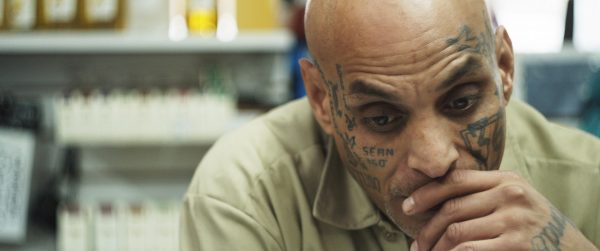
There are several steps Sarah can take to make this process go more smoothly. For example, she could make a conscious effort to look for “clues” that would help guide her in her assessment. Such clues most readily take the form of synchronicities, those perfectly tailored “coincidences” that provide hints about where we are, what we’re doing and where we’re supposed to go. They’re so attuned to our circumstances, in fact, that they’re often accompanied by those “aha!” moments we find so uncanny. And, given their impact and personalized meaning, they’re not to be ignored. Of course, the reason for that is they’re essentially coming from us, fitting reminders and attention grabbers that arise as tangible manifestations of our own beliefs. Anyone who experiences such incidents and recognizes the highly personal nature of them should embrace them and try to understand them, not look on in mere blind wonder or seek to write them off as pure chance. Indeed, there is no “coincidence” in these “coincidences.”
Then there’s the effort to cut through the camouflage that may be obscuring our view of our circumstances. These outward façades hide the real truths we’re supposed to see, often leading us to the wrong conclusions and sending us down the wrong paths if we accept them without question and don’t recognize them for what they truly are. These manifestations are ultimately designed to help us sharpen our powers of discernment, to see the truth more clearly, frequently as a means to get a better handle on our own beliefs, as well as what we’re creating with them and why. Sarah could benefit tremendously from engaging in such an effort, especially since she’s being bombarded by so much of this as she seeks to sort out her life during this transition.
The foregoing practices are not only valuable in and of themselves, but they’re also important to something even bigger – the process of getting real with ourselves. If we’re truly to find happiness and contentment in our existence, we have to be honest with ourselves, examining, assessing and accepting our circumstances with personal integrity. To do otherwise could lead to serious bouts of self-deception that might take us a long time to overcome. To succeed at this, we must be willing to take a frank, unfettered look at things and use that as the basis for moving forward. This could involve such practices as being willing to accept hard truths. It also would likely help if we could learn to laugh at ourselves and our foibles, something for which Sarah has plenty of opportunities available to her in this story.
We should also be willing to accept the help that is available to us; we need not endure such scenarios by ourselves. And, fortunately for Sarah, there are a number of sources of assistance at her disposal. Most notably there’s Pitt, who genuinely seems to want to help her, even if his no-nonsense style sometimes comes across as a little brusque. Then there are Sarah’s neighbors, the Malinova-Thayer family, who often are willing to step in and help, even though they have more than their own share of comic challenges to resolve, many of which Sarah is able to assist them with. Indeed, one hand really does wash another.
Through these endeavors, Sarah comes to learn a great deal about herself, her life, what she wants and what she thought she wanted. She discovers how we don’t need to run away from our past to still be ourselves. Striking a balance between heritage and our hopes for the future need not be a mutually exclusionary process. Arriving at a happy medium can have a considerable impact in shaping our overall outlook, perspective and beliefs on life, making it possible for us to unearth the personal queen of glory that resides within each of us.
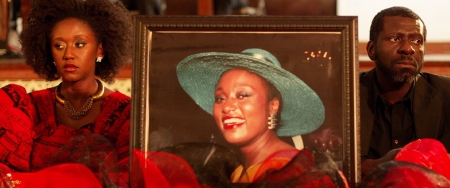
To paraphrase an old adage, you can take someone out of their native culture, but you can’t take the native culture out of that person. So it is here as Sarah as she struggles to assert her Americanized ways and distance herself from what she sees as her folksy, homespun roots and the discomforting uber-Christian, uber-chauvinistic values of her family members. But Sarah’s past is a big part of who she is, even as a self-determining adult, and reconciling it with her present and future is something many of us – but especially children of immigrants – must do. These are themes effectively brought to life in actor-writer-director Nana Mensah’s delightfully wry comedy, a delightful wacky exercise that effectively tickles the ribs of those of us who come from overbearing families. The deliciously wicked laughs served up here are reminiscent of those found in films like “Shiva Baby” (2020), “Home for the Holidays” (1995) and “The Forty-Year-Old Version” (2020). A few sequences feel a little drawn out, which is somewhat surprising given the picture’s comparatively short 78-minute runtime, but this is a film with its heart – and funny bone – in the right place, making for an agreeably amusing watch.
“Queen of Glory” has had what could probably be considered one of the longest roll-outs in movie history. Shot in 2014, the picture first started appearing at film festivals in 2021 and has been running at those events ever since. It recently earned a shot at a brief, limited theatrical run and, in all likelihood, should be available for streaming in the near future, but it’s an offering not to be missed. And, for its accomplishments, the film received two 2021 Independent Spirit Award nominations for best first feature and for Gattuso’s supporting actor performance, offering more evidence of this offering’s cinematic viability.
The frustrations we experience in life can be quite annoying, making us legitimately wonder why we’re enduring them. But maybe their presence is intentional, distractions designed to steer us away from life paths that might ultimately prove detrimental. It may take us some time to realize this, too, which could easily prolong the difficulties we undergo. However, if we look at them with a critical eye, we might just see that they occur to spare us greater grief down the road. And, considering that those “beneficial hindrances” ultimately arise from within us, we might come to see that these seemingly wayward developments are actually our own efforts to save ourselves. There’s much to be said for such forms of self-protection, proving that the greatest love coming our way truly comes from within us, and we should be ever thankful for that.
Copyright © 2022, by Brent Marchant. All rights reserved.

“Emily the Criminal” (2022). Cast: Aubrey Plaza, Theo Rossi, Bernardo Badillo, Jonathan Avigdori, Megalyn Echikunwoke, Gina Gerson, Sheila Korsi. Director: John Patton Ford. Screenplay: John Patton Ford. Web site. Trailer.
Life is full of hard choices, and, fittingly enough, they nearly always materialize during periods of hard times. Still, despite the uncannily synchronous nature and timing of such matters, that doesn’t make them any less challenging to address. And, as much as many of us would rather not deal with such issues, they must be handled, lest we be saddled with even bigger problems to solve. Those solutions may not prove to be adequate or prudent, either, even if they act as stopgap measures to get us through tough times. So it is for a young woman saddled with potentially overwhelming conditions in the new crime drama/character study, “Emily the Criminal.”
Poor Emily (literally). The 27-year-old Los Angeles catering company worker (Aubrey Plaza) is drowning in debt, most notably $70,000 in student loans for an art school degree that she didn’t even finish. And, due to a minor criminal record that mercilessly clings around her neck like a millstone, she’s unable to find a better-paying job due to difficulties with passing background checks. So she struggles to get by just to cover living expenses and interest on her outstanding loans, with the principal on those debts going virtually untouched. She’s trapped on a financial treadmill, and it’s amazing she’s able to carry on.
To her credit, though, Emily makes a sincere, concerted effort to play by the rules in paying off what she owes. She scrambles to generate cash whenever she can and diligently goes on job interviews. She also periodically meets with her longtime friend, Liz (Megalyn Echikunwoke), with whom she grew up and later attended art school. Liz managed to complete her degree and is now comfortably employed, and she makes what appear to be genuine efforts aimed at helping Emily land an internship where she works. But making that happen is easier said than done, given that Emily doesn’t have a sheepskin, despite being only a handful of credits away from completing her degree. Liz’s boss Alice (Gina Gershon) dangles her share of underwhelming carrots before her, but genuine, meaningful promises are hard to come by. So Emily continues to soldier on as best she can, even though the frustration level is constantly being ramped up.
Circumstances change one day, however, when Emily’s co-worker, Javier (Bernardo Badillo), asks her for a favor. She’s initially reluctant to comply with his request, but he makes it worth her while by giving her a lead on how to make a quick $200. So, in return for the tip, she agrees to help him out. However, when Emily texts the number Javier gives her, she’s met with a vague response. She’s simply given an address to show up at the following day if she’s interested, leaving her somewhat unsure of what she’s getting herself into. But the prospect of a quick cash score is enough to convince her to follow through and see what it’s all about.
Upon arriving at the designated address, she’s rushed through a series of interrogations in which she’s pressured to provide information about herself and the source who told her about the lead, all without explanation of what’s going on. After being put through her paces, she and a group of others are then assembled for a “presentation” of what this mysterious opportunity is all about. Stepping up on a makeshift presentation platform is a somewhat shady-looking character who appears to be one of the head honchos of this operation. His name is Yousef (Theo Rossi), and he starts out by letting everyone know that what they’re about to engage in is illegal. He offers them the opportunity to leave if they’re uncomfortable with that, but he also notes that, if they agree to participate, they’ll each get the $200 promised to them. Intrigued, no one leaves, including Emily, all of whom wait on what Yousef has to say.
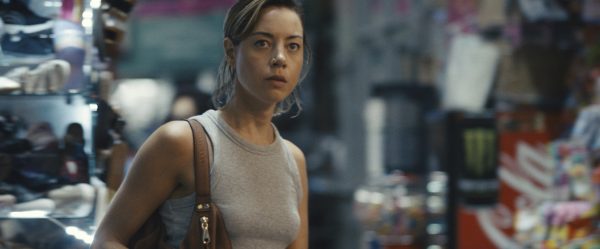
In essence, Yousef describes his operation as a “dummy shopper” scheme, a credit card scam in which phony credentials are created and used to make purchases of various types of merchandise, such as high-end electronics, that are then resold for cash on the black market. Given that the goods are acquired with counterfeit credit cards (backed up by fake driver’s licenses bearing the names of fictitious individuals), the retailers have no one against whom they can collect on the approved charges, leaving them with no recourse once the “purchased” merchandise leaves their outlets. It’s a practice that, in most instances, allows the dummy shoppers to walk away scot-free – and puts saleable brand name goods in the hands of Yousef and his band of criminals.
When Emily successfully pulls off her first “purchase,” she receives the promised fee. And, given the ease with which she carries out the task, Yousef is impressed with her moxie, offering her an opportunity for an even bigger score the following day. Details of that job are again sketchy, but, considering how easily she was able to get away with her first gig – and the promise of a more lucrative payday – Emily decides to take Yousef up on his offer.
The second heist proves somewhat more problematic, leading Emily into legitimate danger. But, given her financial circumstances, she again manages to rise to the occasion. She discovers she has quite a knack for this kind of work, and she relishes the income it generates. And, the more she does it, the more impressed Yousef becomes. The time it takes away from her catering job leads her to rearrange her work priorities, but, when she assesses the money she’s earning from her respective gigs, it becomes easier for her to alter her routine – and to do whatever it takes to ensure her success in her newfound line of “work.” It also helps that Yousef’s backing starts to turn personal, giving her another reason to change lanes when it comes to making money.
As the stakes are upped, it becomes apparent that Emily is ever more willing to do whatever it takes to reach her financial goals, even if that means resorting to ruthless or underhanded measures. She still claims to be interested in fostering an art-related career, though her passion for it is decidedly waning, especially when the monetary considerations of her new pursuits take precedence. She also feels compelled to zealously rally her support behind Yousef, particularly when he comes under increasing scrutiny from his cousin and partner in crime, Khalil (Jonathan Avigdori), who is beginning to believe that Yousef is growing too powerful, leading to a struggle for control of the operation. And, of course, there’s Emily’s ongoing fiscal crisis, which she still needs to address, despite all of these other conditions.
How will everything shake out? That depends on how far Emily and Yousef are willing to go in light of what they’re up against. A number of high-stakes twists and turns are in play, whose outcomes hold the potential of taking events in some unexpected directions. But, when one’s back is up against the wall, there’s no telling what one is capable of – and what can ultimately result.
When we’re faced with overwhelming circumstances that threaten to undermine our existence, we may panic with what we’re up against. But how are we to deal with such conditions? The feelings of desperation we often experience in scenarios like this could easily consume us, possibly sending us down paths from which there’s no return.
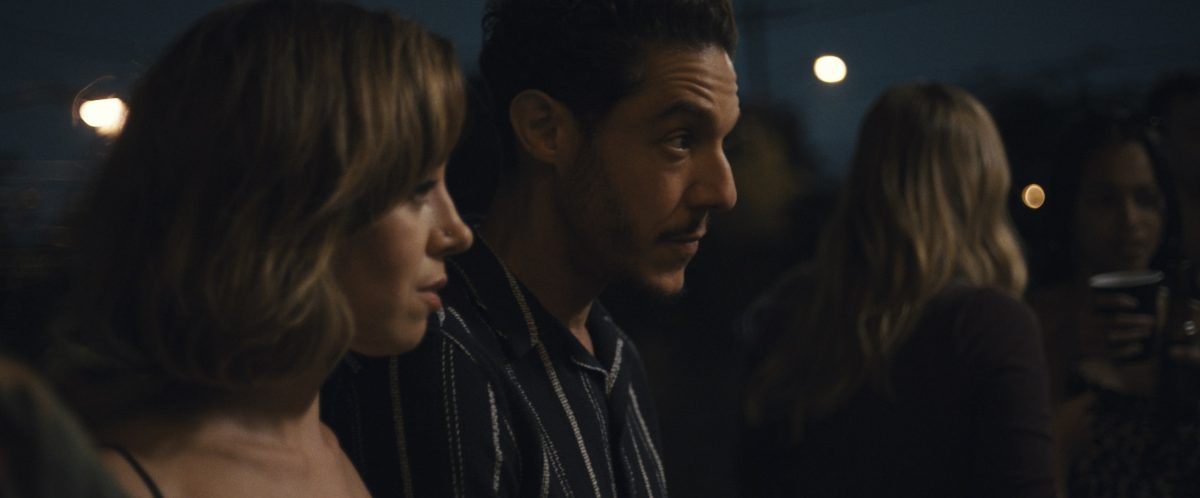
These are times that call for creativity, for thinking outside the box, pushing boundaries and overcoming fears and limitations. These are all challenges in themselves, the particulars of the specific problems we face notwithstanding. And, even if we manage to devise solutions to the issues at hand, they typically won’t do us any good if we don’t believe in their viability. This is where the conscious creation process comes into play, the philosophy that maintains we manifest the reality we experience through the power of our thoughts, beliefs and intents, the building blocks of existence. Should we fail at this, we’re likely screwed; but, if we’re convinced of the veracity of our plans, we stand a good chance of making things work.
Granted, we must take into account that these “solutions” may contain inherent faults of their own. They might solve a problem at hand but, in turn, create other new ones in their wake. Admittedly, this may not be an ideal way to reconcile these matters, but they could help to back us out of a corner – even if they subsequently place us in yet another one. However, if we recognize that resolving these overarching issues is truly a process, we might well put ourselves onto a path that ultimately leads us out of our troubles for good. What we must be sure to do, though, is remain committed to achieving resolution, an undertaking that could require multiple steps involving the fulfillment of multiple manifestations to finally attain the desired result.
That could prove tricky in several respects. To begin with, we may become weighed down by beliefs related to fear, doubt and limitation that could undermine our grander plans, keeping them from materializing as intended – or at all. But, even if we’re able to forestall that potential pitfall, we may erroneously come to believe that devising effective solutions to our challenges is a “one and done” practice. Such thinking fails to take into account the notion that the creation of our existence is, in itself, an ongoing process, one that relies on a series of sequential manifestations that collectively constitute the unfolding of our reality, including all of its components, such as those associated with resolving our challenges. This principle, in fact, helps to define and characterize the very nature underlying this school of thought – that we’re all in a constant state of becoming.
These are the principles that Emily is learning as her odyssey progresses, even if she’s not consciously aware of them. Considering where she begins – as a victim of a rigged system in which she has unwittingly allowed herself to become and remain trapped – she faces a tall order to rid herself of the burdens she’s saddled with. And the more the screws are tightened, the more desperate she becomes to find a way out of her circumstances. However, she gradually learns that she’s not going to be able to free herself by playing by the rules that have kept her stuck. She eventually realizes that, if she’s to escape this cage, she must write her own rules, ones that work to her favor, even if that means going against standard accepted practices.
And, considering what she’s long been up against, many might observe, “Who can blame her?” She’s been held back and taken advantage of in ways that have made it virtually impossible for her to break free and move forward. At the same time, however, one still can’t help but question some of her choices, decisions that could leave her with even bigger problems to solve, with even more dire consequences awaiting her. Her creations might liberate her from her current circumstances, but they could potentially manifest other, more troubling conditions requiring even greater materialization efforts to absolve herself down the road. Her story thus serves up a powerful cautionary tale, one that could help her out in the short run but that could significantly up the ante for the long term. It’s a potentially puzzling conundrum that clearly requires her to pick her solutions – and their underlying thoughts, beliefs and intents – carefully.
All of this raises important issues related to responsibility. As the creators of our existence, we’re the ones responsible for how it unfolds, for better or worse. The choices we make with regard to what we manifest – and how we respond to it – carry consequences for which we are ultimately accountable. We should never lose sight of that, either, especially if we focus on the outcomes of our creations to the exclusion of the side effects that may accompany them, a practice known as un-conscious creation or creation by default.
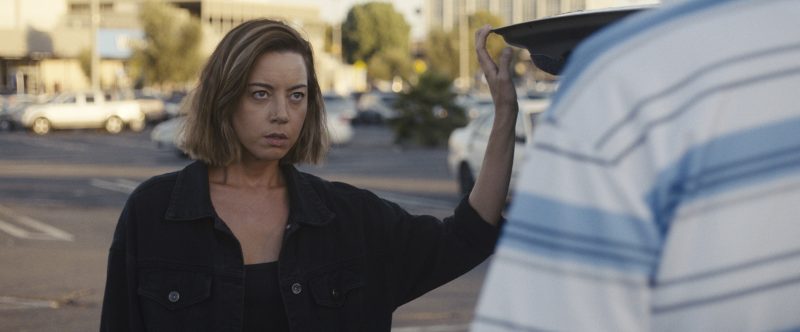
The impact of such fallacious thinking can be felt in several ways in this story. Emily’s rule-bending actions could work to her benefit, or they could become riddled with hazards that are impossible to recover from. At the same time, those who created the conditions that ensnared Emily in her dilemma also bear some responsibility for how affairs have played out. Those who came up with the rules regarding her loan repayment obligations, her employability prospects and the impact of her criminal record all contributed to creating the circumstances that have made Emily the person she has become. Indeed, responsibility truly cuts both ways; if we wish to avoid the kinds of problems on display here – and, regrettably, in the real world at large these days, too – then efforts must be made on both sides to prevent, or at least mitigate, their emergence in the first place.
Emily’s story should thus serve as a powerful life lesson for those on both sides of table in this scenario. That’s particularly true where it comes to the agendas – and the beliefs underlying them – that have created the conditions present in this all-too-familiar narrative. When looked at logically, it all seems so patently absurd and intrinsically unnecessary. So why do we continue to pursue such avenues of existence? That’s an excellent question, one that maybe we should all ask ourselves a little more often – and decidedly more thoughtfully. To do less, one might argue, would be … criminal.
Given the level of graft, corruption and manipulation in contemporary society, it often seems like the only way to get ahead is to cheat, even if it means breaking the law. The age-old wisdom of working hard, playing by the rules and being fair seems “quaint” to many, especially among many of today’s young adults, who feel as though they’ve been saddled with insurmountable debt from dubious lending practices like those associated with burdening student loans. But what is one to do when the old rules simply don’t work and a new solution is needed to break out of financial bondage?
Those are the questions raised in this taut new thriller about a young woman torn between following her principles and being practical in the face of staggering odds. Writer-director John Patton Ford’s debut feature addresses these issues head-on in a straight-up drama about what desperation can prompt us to do when we feel we’re running out of conventional options. The film provides a positively superb showcase for actress Aubrey Plaza in her award-worthy performance as the beleaguered protagonist, who finds it surprisingly easy to turn to what many older viewers might see as a series of questionable and unethical choices, despite the fact that she often sees no other way out of her circumstances – and the troubling path that they set her on for the future. Some may also see some of the narrative’s developments as a little far-fetched, but one simultaneously can’t help but wonder what we would do if we found ourselves in the title character’s shoes, a notion effectively brought front and center through the film’s writing, acting and direction. This surprisingly thoughtful offering dressed up as a somewhat conventional crime drama makes for an intriguing fusion of genres that will have you on the edge of your seat for its economical and always-engaging 1:37:00 runtime. Don’t sell this one short; it may not be widely known, but it’s well worth a look. The film is currently playing theatrically.
It’s unfortunate that getting square these days often requires a certain degree of getting even. As we move into what we hope will be more enlightened times, hurdles like these need to be overcome. But, if we’re to succeed, we need to take as much of a look at how we set the rules as we do in determining the consequences of breaking them. These decisions indeed represent hard choices for hard times, and the challenges in adjusting them lie with the parties on both sides in these scenarios. The question in this is, “Do we have the will to carry out this task?” Much depends on what we believe and our willingness to follow through on them. We can only hope that we won’t fall back on desperation, criminality or dishonesty to place us in jeopardy or on complacency, excuses or stubbornness that keep us locked in place – or potentially behind bars.
Copyright © 2022, by Brent Marchant. All rights reserved.
Tune in for the latest Cinema Scribe segment on Bring Me 2 Life Radio, beginning Tuesday August 23, available by clicking here. You can also catch it later on demand on Spreaker, Spotify, Apple, iHeartRadio, Google Podcasts, Castbox, Deezer, Podchaser and Jiosaavn.
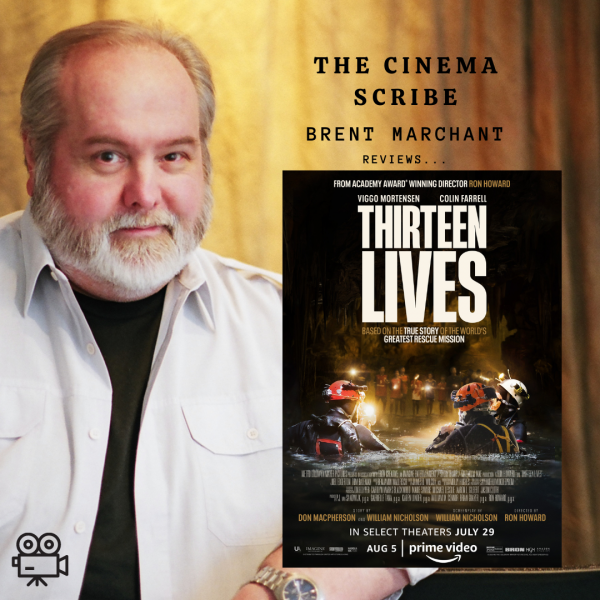

“Thirteen Lives” (2022). Cast: Viggo Mortensen, Colin Farrell, Joel Edgerton, Tom Bateman, Paul Gleeson, Sahajak “Poo” Boonthanakit, Tui Theerapat Sajakul, Weir Sukullawat Kanaros, Thira Chutikul, James Teeradon Supapunpinyo, Lewis Fitz-Gerald, Peter Knight, Popetorn “Two” Soonthornyanakij, Pattrakorn Tungsupakul, Aom-Sin Pasakorn, Achi Jinapanyo, Smart Tanatat. Director: Ron Howard. Screenplay: William Nicholson. Story: Don MacPherson and William Nicholson. Web site. Trailer.
It’s quite something when an event happens that captures the world’s attention. Unfortunately, it usually involves some form of natural or manmade disaster or the death of a prominent figure. But then there are times when occurrences take place that collectively captivate us, bringing out the compassion and humanity in us all and frequently producing miraculous results. These events embody the best in all of us, showing that we are indeed capable of great things when we put our hearts, minds and efforts to it, a scenario heroically depicted in the new fact-based historical re-creation, “Thirteen Lives.”
For 18 days during the summer of 2018, the world’s attention was focused on the attempted rescue of 12 young soccer players and their coach (James Teeradon Supapunpinyo) who were trapped inside the flooded Tham Luang Nang Non cavern in northern Thailand’s Chiang Rai province. An unexpected monsoonal rainstorm moved in over the mountain towering over the cave, enabling huge volumes of water to percolate downward through crevices and sinkholes, quickly inundating the channels and chambers of the long, deep cavern system. Given that the storm occurred before the typical start of monsoon season, it took everyone by surprise, forcing the intrepid young cave explorers to hastily flee in search of safety. However, for much of the time after the flooding initially began, no one knew for certain what fate befell the missing.
Rescuers flocked to the cave to try and figure out what to do. Considering the hazardous conditions in the narrow flooded corridors, it wasn’t clear if even experienced cave divers could make their way through the tight passageways. And, in light of that, authorities overseeing the project weren’t sure they could sanction such ventures given the danger involved, especially with no guarantee of finding anyone still alive. Even expert responders like Thailand’s Navy SEALs were unsure if they’d be tapped for such a treacherous mission.
As officials contemplated how they might reach the survivors (if any), they undertook efforts to stem the tide of the flooding, such as looking for ways to divert the flow of rainwater off the mountain so it wouldn’t penetrate the crevices and worsen conditions inside the cave below. It was believed this measure might increase the survival chances of the missing, but diverting the flow would come at a cost: It would flood adjacent agricultural fields and wipe out the rice crops of peasant farmers. However, considering what was at stake, the farmers willingly agreed to the plan if it might help the boys and their coach, despite the uncertainty of their fate. That’s because, as their story spread, the missing 13 were increasingly being seen as the responsibility of everyone in Thailand, not just those actively working on their possible rescue.
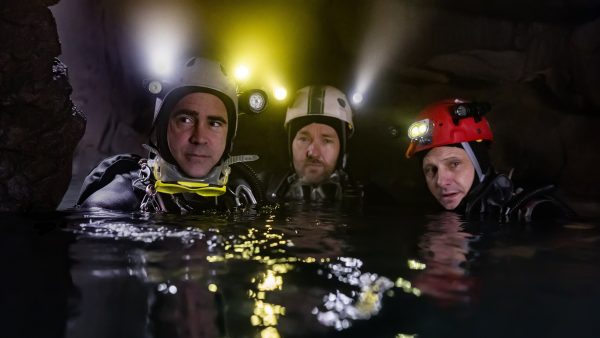
Despite efforts like those aimed at redirecting the flow of rainwater, officials were concerned about other issues, such as the availability of oxygen inside the cave. Even if the team had somehow managed to survive, it was unclear whether or not they would have enough breathable air, considering that every breath they took would lead to the release of carbon dioxide and dilute the available oxygen level. With the clock ticking, authorities realized that they had to intensify their efforts before time ran out.
This intensification led to a ramping up of efforts on multiple fronts, with volunteers pouring in from all over. Volunteer ranks estimated at 10,000, made up of specialists and everyday individuals, from 17 countries took part, all with one goal in mind – saving the boys and their coach, if at all possible, at virtually any cost.
Spearheading this intensified effort were expert cave divers, led by Rick Stanton (Viggo Mortensen) and John Volanthen (Colin Farrell) from the UK. Nine days after the 13 went missing, Stanton and Volanthen succeeded in finding them deep inside the cavern in a chamber where they had been holed up on an internal “beach,” located approximately 2.5 miles from the cave mouth. Needless to say, the divers were stunned and grateful to find everyone still alive. But the next question became, “How do we get them out?”
The elation of finding everyone alive quickly dissolved when authorities and divers assessed the logistics of rescuing the trapped youngsters. The thought of trying to guide untrained youthful divers through the narrow passageways for a distance of 2.5 miles was daunting. In addition to the boys’ lack of diving skills, rescuers were also concerned about them being able to remain calm for such an untested long-distance “swim.” But, considering the alternative – everyone inevitably suffocating from a lack of oxygen or drowning from new flooding if nothing were done in time – it seemed wholly unconscionable to willingly abandon them, leaving them to die knowing that they were indeed alive before that was allowed to happen. So what were the rescuers to do?

Stanton and Volanthen reviewed various options, though all of them were considered unfeasible. But then they came up with a brainstorm that could be a possible breakthrough. They proposed seeking the assistance of Dr. Richard “Harry” Harris (Joel Edgerton), an Australian cave diver and practicing anesthesiologist. Stanton and Volanthen recommended a novel but exceedingly risky plan for retrieving the boys and their coach. It was a proposal that not only posed tremendous risks for the youngsters, but also the divers. It also raised ethical issues that Dr. Harris initially found entirely unacceptable. However, with no other viable alternatives available, a dwindling time window and the threat of more rain with the official arrival of monsoon season, the rescue team had to act – and quickly – if it were to carry out the plan.
The mission proved to be an effort mixed with the miraculous and the tragic, but it brought people together in ways no one had likely imagined possible. And its impact was felt not only by those directly involved in the effort, but also by those who lent their thoughts, prayers and energy to the success of the operation. It was a venture that stirred the world, touching individuals around the globe, reaching far outside the borders of Thailand. But, perhaps most importantly, it illustrated what’s possible when we all work toward a common goal, no matter what the capacity, one that brings out the best in us and shows what we can do if we collaborate and put our minds together.
If only we as a species could cooperate and collaborate with one another like this all the time, we’d have much more about ourselves to be proud of! The effort that went into this rescue truly illustrates the notion of the total being greater than the sum of its parts. In an age when callousness and indifference are all too often allowed to determine the course of events (and all of the “collateral damage” that comes with them), it’s heartening to see we’re still capable of mounting a Herculean effort to save the lives of 13 people, a number that, sadly, might otherwise be readily written off as inconsequential or not worth the risk.
So what makes this scenario different? The beliefs that went into its execution made all the difference. The underlying sense of compassion alone significantly drove the effort to carry on in the face of seemingly impossible odds. But, more than that, a sincere belief in attaining success in this endeavor made it happen thanks to the conscious creation process, the philosophy that maintains we manifest the reality we experience through the power of these intangible resources. It’s not clear how many of those involved in this venture had heard of this school of thought, but, based on the results achieved, it’s obvious that its participants believed in the viability of its principles and subsequently made them work.
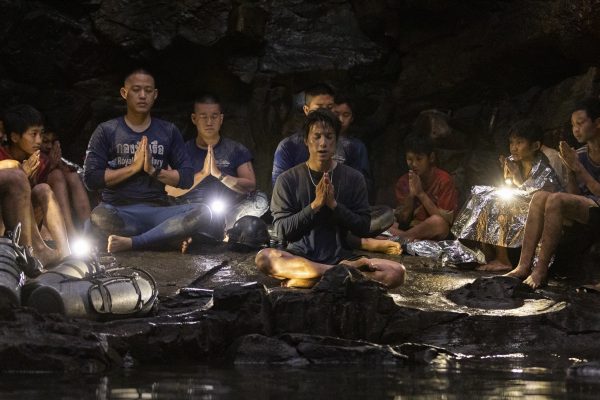
There’s much to be said for the power of belief, even if one doesn’t use this particular term to describe what was involved here. Call it prayer or invocation or supplication or intent or whatever other word best suits you for describing the means to achieve the desired outcome. At bottom these notions all essentially stem from the same source of origin – what we hold in our hearts and minds for arriving at the intended destination. And, based on what unfolded here, there’s pretty powerful evidence to indicate that it genuinely works, despite the seemingly insurmountable conditions here that might have made such results seem impossible.
To a great degree, the overarching perspectives that participants hold regarding such an undertaking play a significant role in the process as it plays out. In many ways, this scenario draws heavily from the notion of determining whether the glass is half empty or half full. Those who held fast to the former perspective could very well have undermined the outcome. Meanwhile, those who remained open and steadfastly held on to options, hope and the materialization of a breakthrough solution saw their convictions and beliefs realized. Again, there’s much to be said for the power behind these intangible tools and what they can enable.
The specific beliefs constituting this perspective, of course, played a key role in the course of events. Paramount among these notions were the faith and trust that participants placed in achieving a successful outcome. In fact, they essentially served as the foundation of this effort, one whose success likely wouldn’t have been attained without them.
At the same time, the noticeable lack of certain other beliefs was crucial as well. By excluding or minimizing beliefs related to fear, doubt and limitation, the rescuers were able to keep such influences at bay in terms of any impact they might have had on the process. This is not to say these elements were totally absent, as evidenced by the occurrence of one notable tragedy that took place during the implementation of the rescue team’s plan. However, in the greater scheme of things, considering what everyone was up against, the fact that these undue influences were prevented from having a greater impact is indeed remarkable.
Of course, none of this could have happened without the aforementioned spirit of cooperation and collaboration. This included everyone who played a part in this multifaceted heroic co-creation. There were the divers, the rain-diverting engineers and their support teams, whose hands-on efforts made the plan work. Then there were the countless individuals who prayed for a successful outcome, both on their own and in organized vigils, around the globe. And, needless to say, there were the trapped victims themselves, who found a way to safety and managed to stay alive for a seemingly interminable length of time, doing their part to make the efforts of the others worth their time, energy and heroism.

Perspective played a significant role in this, too, most notably where the coach was involved. Having acted as chaperone for the boys in their cave exploration, he felt personally responsible for their well-being. During their time in the cave, he went to great lengths to keep them alive, such as leading them in meditation to keep them calm and to help them regulate their breathing to avoid using up precious oxygen. On top of that, he unknowingly benefitted from the intangible support of those who prayed for the missing; while he was worried that he’d be blamed for the circumstances in which the youngsters found themselves, he was instead praised for his efforts at helping to keep them alive at a time when they might have just as easily perished. This is more proof of the power of beliefs at work and what they can yield for the benefit of all concerned.
Taken collectively, the elements that made for a positive outcome truly represent a remarkable example of what we can achieve when we draw upon the power of properly formulated beliefs and what’s possible when their strength is combined. We should follow that lead and sincerely make an effort to employ such measures on an ongoing basis if we hope to make this the world many of us hope it can be. This is just one such illustration of what’s possible when we do that. Maybe we should all heed the message in this – and consciously make the effort to put it to use.
This inspiring story truly moved people around the globe, and director Ron Howard has brought it to life in a technically masterful re-creation. The level of logistical detail on display here is commendable in virtually every respect, frequently making for an edge-of-the-seat watch. However, as capably made as this picture is, its 2:29:00 runtime can occasionally try the patience of even the most committed viewers, including when the tension level is cranked up, especially in sequences where the action essentially becomes repetitive. This is by no means intended to diminish the uplifting nature of the story or the adeptness with which it has been produced cinematically, but, given the emphasis on the picture’s technical merits, this approach to telling the tale tends to shortchange the emotional impact somewhat. A journalistically styled by-the-numbers take on telling a story like this is fine, but I was hoping for something a little more heartfelt at times in light of the miracle this epically heroic real life yarn turned out to be. “Thirteen Lives” definitely earns a more than passing grade, but I can’t help but wonder what it might have been with the infusion of a little more emotion – and a lot more heart-tugging. The film played briefly in theaters and is now available for streaming online.
Enlightening stories like this genuinely deserve wider attention and recognition in the current zeitgeist. If we were to become more aware of what we’re doing right as a species than being fed a diet of where we’re deficient, we just might change our overall perspective on life and what we’re capable of achieving. It would provide us with a new outlook and potentially a new set of beliefs for manifesting a better, more caring reality. It might even prompt us to see our existence as a glass that’s more than half full, one that’s brimming with possibilities in which we’d readily step up to participate as engaged members of the human collective. And what a world that would be.
Copyright © 2022, by Brent Marchant. All rights reserved.
Reviews of "Mrs. Harris Goes to Paris," "Inversion" and "The Berrigans: Devout and Dangerous" are all in the latest Movies with Meaning post on the web site of The Good Media Network, available by clicking here.

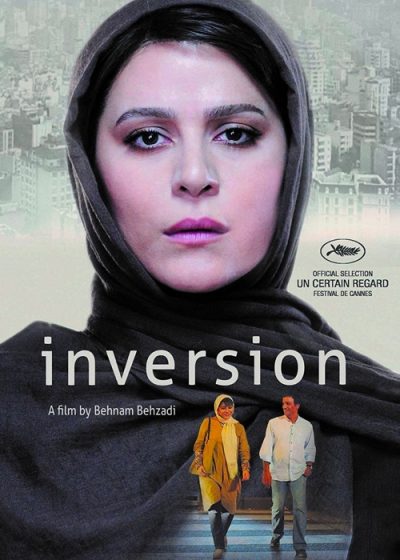



“Mrs. Harris Goes to Paris” (2022). Cast: Lesley Manville, Isabelle Huppert, Jason Isaacs, Alba Baptista, Lucas Bravo, Ellen Thomas, Rose Williams, Anna Chancellor, Lambert Wilson, Guillaine Londez, Freddie Fox, Roxane Duran, Philippe Bertin, Bertrand Poncet, Delroy Atkinson, Christian McKay. Director: Anthony Fabian. Screenplay: Anthony Fabian, Carroll Cartwright, Keith Thompson and Olivia Hetreed. Book: Paul Gallico, Mrs. ʼArris Goes to Paris (1958). Web site. Trailer.
We all have dreams, and we’d like to see them realized. However, many of us believe they’re unreachable objectives, pie-in-the-sky goals that can be envisioned though never experienced. But must that be the case? Is there no chance of them ever being materialized? It all comes back to those aforementioned beliefs, notions that can make all the difference, as illustrated in the delightful new period piece comedy, “Mrs. Harris Goes to Paris.”
Working class London cleaning woman Ada Harris (Lesley Manville) leads a humble, sprightly, breezy life, but there’s an underpinning of melancholy beneath that cheery façade. It’s been 13 years since her husband, Eddie, went missing in action during World War II, yet she hopefully clings to the notion that he’ll somehow show up in her life again one day. In the meantime, she’s watched time pass her by, reconciling her to a meager existence. She’s been saddled with a need to work to make ends meet, mostly for unappreciative, irresponsible clients who are often in arrears when it comes to paying her for her services, forcing her to take in piecework sewing jobs to cover her expenses. And, personally speaking, there’s been no romance and little companionship in her life, save for occasional trips to the local pub with her friend, Vi (Ellen Thomas), where she matches wits with the resident barfly, Archie (Jason Isaacs). Still, despite these circumstances, Ada does her best to keep a smile on her face, forced though it may be at times.
Ironically, despite her challenges, Ada is usually the first person to step in when others need assistance. That’s apparent, for example, in her dealings with one of her clients, Pamela (Rose Williams), a young, beautiful but flighty aspiring actress. Ada frequently helps her out of tight spots, such as when she frantically needs to prepare for auditions for which she’s anything but ready. One might wonder why she’d make the effort to do this, but, as someone who knows hardship, Ada is only too happy to help when she can.
Of course, there are those who don’t hesitate to take advantage of Ada’s kindness, too, such as one of her supposedly affluent clients, Lady Dant (Anna Chancellor), who is perpetually behind in settling her accounts. She routinely makes feeble excuses whenever Ada broaches the subject, always making, but never keeping, her promises as the money she owes continues to mount. Ada manages to maintain her composure through these episodes, though it’s increasingly obvious she’s unhappy at being taken for granted.
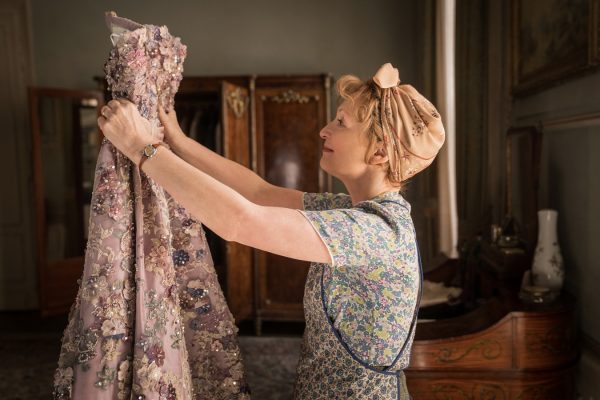
Indeed, when one comes down to it, Ada asks for precious little out of life – just the basics with no need for extravagances. Well, maybe except for one, that is.
While working at Lady Dant’s home one day, Ada spies a gorgeous new Christian Dior gown that she purchased for her daughter’s upcoming wedding. She looks on in rapt admiration, wishing that she could have one like it for herself. But, when Lady Dant tells Ada how much she paid for it – £500 – the wind goes out of her sails. However, if nothing else, Ada is famous for holding out hope; just look at how long she has held fast to the idea that her beloved Eddie might return. And she draws on this reserve of optimism in thinking that somehow, someday, she, too, will have such a dress of her own.
It’s at this point when the wheel of fortune begins unexpectedly spinning in her favor. When an RAF officer (Freddie Fox) officially notifies Ada of Eddie’s demise, she learns that she’s entitled to a generous military widow’s pension. On top of that, she comes into money from winnings at the local dog track. And, when she adds it all up, she realizes she’s amassed sufficient funds to take a trip to Paris to visit the House of Dior to purchase her own haute couture gown.
Once in the City of Lights, however, Ada quickly discovers she’s a proverbial fish out of water. For instance, she has no understanding of how one goes about acquiring a Dior original. She walks into the salon expecting to paw through racks of frocks as if she were shopping at the neighborhood Woolworth’s. And, when Ada encounters members of Dior’s staff, such as Mme. Colbert (Isabelle Huppert), the snooty salon manager, she’s instantly made to feel as though she doesn’t belong – and must be hurried away, given that she’s arrived at a highly inopportune time: the day when the House is staging a showing of its latest collection. However, when Ada grasps what’s happening to her, she stands up for herself and claims she’s entitled to attend Dior’s sartorial soiree, saying that she arrived before any of the other invited guests – and that since she has cold, hard cash in hand to make a purchase on the spot.
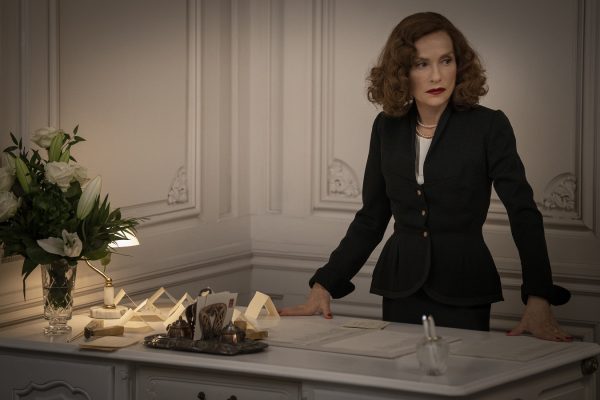
When Ada pulls out the wads of money from her purse, the attitude among Dior’s staff quickly shifts. The salon’s finance director, André Fauvel (Lucas Bravo), is particularly accommodating toward the unexpected arrival; after all, given the financial difficulties that the House has been experiencing, he’s only too happy to accept hard currency in exchange for one of Dior’s designs, especially since many other “clients” are notorious for being demanding but not paying on time (if at all). André welcomes Ada warmly and introduces her to some of the event’s high-profile guests, such as the elegant and charming Marquis de Chassagne (Lambert Wilson), a widowed nobleman who treats her with a level of attention and civility she’s never experienced.
Of course, there are others who aren’t nearly as genial, such as the eminently pompous and condescending Mme. Avallon (Guillaine Londez), wife of the city’s “garbage king” (whose workers, incidentally, are on strike at the moment, leaving the streets of Paris mercilessly strewn with trash). The very thought of having to sit next to a commoner like Ada during the fashion show positively infuriates the malcontented high-brow, prompting her to engage in deliberate acts of spite, just because she feels she can.
This event represents a turning point in Ada’s life, not only in terms of fulfilling her aspiration of acquiring the dress of her dreams, but also in reinventing herself. It’s a transformation that allows her to retain her best qualities while putting them to use for the betterment of her own life and those of others. For example, she draws upon this opportunity to put her capacity to help others to use once again, only this time in a bigger and more meaningful way. This becomes apparent when she plays the part of an impromptu matchmaker for André and one of the House’s models, Natasha (Alba Baptista). She also encourages Natasha to pursue her study of philosophy, an impassioned undertaking she finds far preferable to being a model, despite her stunning beauty. At the same time, she urges André to meet with M. Dior (Philippe Bertin) to explain his plan for helping to financially save the sinking design House, a proposal that could change the fortunes of both.
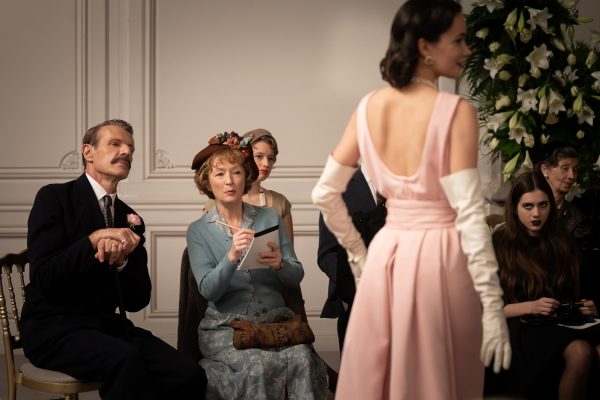
Ada uses this opportunity to change herself as well. Through her connection with the Marquis, for instance, she discovers that it may not be too late for romance. She also finds, in many ways, that she need not have to continue allowing others to treat her badly or to take advantage of her. She’s just as entitled as the blue bloods to the good things in life, even if she doesn’t have all of the elitist trappings possessed by others who are allegedly more sophisticated (many of which prove to be phony, by the way). And, as Ada develops a heightened sense of discernment about these questions, she comes to understand and appreciate what truly matters most in life – regardless of what dress they’re clothed in.
Ada’s trip to Paris thus turns out to be more than just for the purchase of an evening gown. She’s at last able to morph into the butterfly that had long been hidden inside her. It really is an experience in learning to see how our dreams can indeed some true. It’s an outcome that need not be limited to the realm of fairy tales. And it’s comforting to know that we can follow Ada’s lead and realize the same kinds of results for ourselves, no matter what we may be wearing.
In many ways, “Mrs. Harris” is a textbook primer on how to make our dreams come true. And, to a great degree, it draws from the conscious creation process, the philosophy that maintains we manifest our existence through the power of our thoughts, beliefs, intents, and, in this context, our dreams, which, in essence, are derivations of the foregoing. Through Ada’s experiences, we see how these aspirations materialize, even if they don’t necessarily take the routes we’d expect them to. But eventually these cherished conceptions arise, despite taking some seemingly wrong turns along the way.
When such misdirections emerge, it might be tempting and all too easy for us to give up on our dreams ever coming true. However, if we trust the process and hold fast to our beliefs, we realize that these seemingly erroneous turns are actually meant to guide us to what we need and want to make our dreams spring to life. An unexpected left turn, for instance, may us to a fortuitous synchronicity that enables all of our plans to fall into place, something we’d miss entirely if fortunes took us in the direction that we thought needed to be followed.
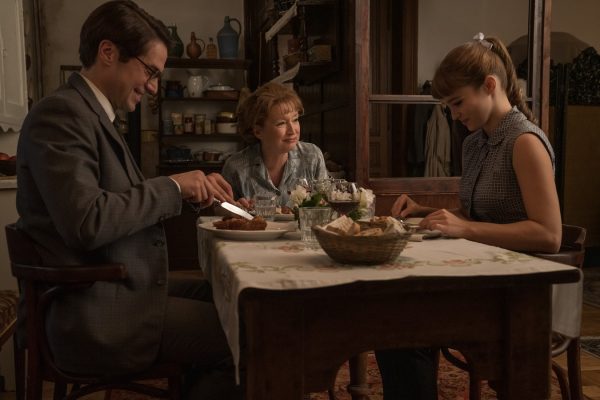
From this, it’s obvious that faith is an integral component in making this process unfold. And that’s important to recognize in that faith is itself a form of belief, one whose presence needs to be incorporated into the mix of beliefs driving the process of bringing us what we seek. It need not be employed in an extreme, obsessive form, as that actually might suggest a lack of trust that could undermine the manifestation process, but it needs to be present to a sufficient degree to signal that we’re comfortable with, and confident about, what’s going to result.
To make this work, we also need to rule out any potential impact that fears, doubts and limitations might have on this process, as beliefs in these elements can all undercut matters to a point where our dreams manifest either in distorted forms or not at all. One can see this to an extent with Ada at the opening of the film, where her long-held uncertainties about Eddie’s fate have kept her locked in place for 13 years. Her doubts about what happened, her fears of knowing the truth and the limitations that she has allowed to be imposed on her life have all kept her stuck in a less-than-satisfactory life. The result of that has been a financially strapped existence without romance and virtually no prospects of seeing any of her dreams come true. However, when she unshackles herself from such metaphorical millstones, things begin to change in big and better ways. And who would think that such an outcome could arise from something as simple as a change in outlook? Indeed, anyone who understands that is well on the path to seeing his or her dreams come to life.
Of course, to see this process through, one must also be careful not to become a doe-eyed Pollyanna, either. Our clarity of thought and personal integrity – hallmarks of our true self – may well be tested along the way. These “tests” often challenge our ability to spot what works and what doesn’t in the fulfillment of our wishes. They help us identify pitfalls that can derail our plans by sharpening our powers of discernment. Some seemingly valuable influences, for example, may be helpful to certain aspects of the process, but that doesn’t necessarily mean their assistance will be never-ending; at some point, their usefulness may run its course, at which time they need to be jettisoned, because they can become dead weight or a hindrance if allowed to persist. Letting go of these influences may be difficult but nevertheless necessary if we’re to carry forward, a lesson that can subsequently challenge our faith, too. However, if we hone our discernment skills, we stand a much better chance of seeing things through to the outcome we hope for.
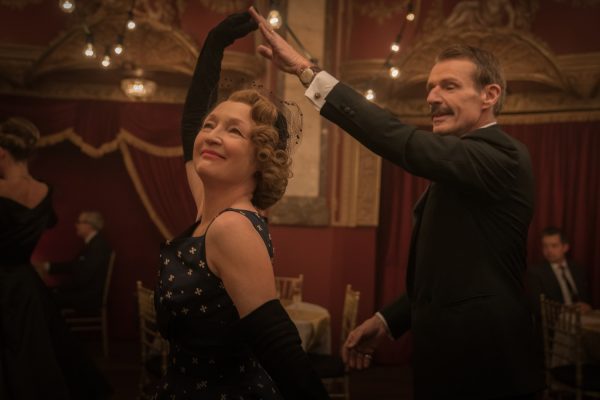
A keen sense of discernment can also help us see what’s truly most important. Ada comes to appreciate this as she wends her way through her adventure. The glitz, glamour and elegance of haute couture and the high life may indeed be quite seductive. But is it genuinely everything it’s cracked up to be? Is there a wisdom and mature sophistication behind the façade, or is it mere window dressing covering something inherently shallow? Are there aspects to life that are more important and more meaningful than being able to display the latest aesthetic trappings? Moreover, what are we to think when we see the truly ugly aspects of this supposedly enviable lifestyle firsthand, such as the inexcusable behavior of Mme. Avallon and Mme. Colbert, not to mention the garbage-laden streets of a city as allegedly unassailably elegant as Paris? These are determinations we must often make in situations like this, and that can be difficult, especially when the style hounds attempt to thrust attitude upon those of us who aren’t in their league of haughty fashion plates. Are their attempts at intimidation to be taken seriously, or are they merely defense mechanisms designed to cover a lack of knowledge of something more substantial? (Ask Ada if you want the answer to that.)
This is especially true when it comes to the exclusivity factor often associated with the high fashion world. Mme. Colbert, for example, prides herself on the reputation that Dior has established for itself as one of the most exclusive design houses in Paris, if not the world. Yet it’s become so select that it’s brought itself to the brink of financial calamity. What’s smart about that? Indeed, why can’t others (i.e., the average, everyday consumer) enjoy the good things in life just as readily as the financial elite do? Are the heads of the House so unenlightened that they can’t see the value in that? Where is their power of discernment? Ada’s influence in this scenario thus carries the seeds of helping Dior see its dreams come true, too – a new market and a stable financial footing for the future, all made possible by helping the organization’s leadership see what’s possible with a shift in beliefs.
Ada’s role in this development brings to light perhaps the most significant theme to come out of this story – that of living one’s destiny. Ada has spent 13 years patiently paying her dues while holding a number of dreams at bay, but now it’s time for her to liberate them, to see them come true. And it’s a valuable skill that she can employ not only for herself, but also for others by showing them the way to realize their dreams. This is a conscious creation practice known as value fulfillment, through which we live our lives as our best, truest selves for our own benefit and betterment, as well as that of those around us. This is certainly apparent in how Ada’s odyssey plays out, but it’s also significant in the lives of many others around her, such as André, Natasha, the Marquis, M. Dior and even Mme. Colbert. There’s much to be said for that. But, then, after all, who wouldn’t want to see their dreams come true?
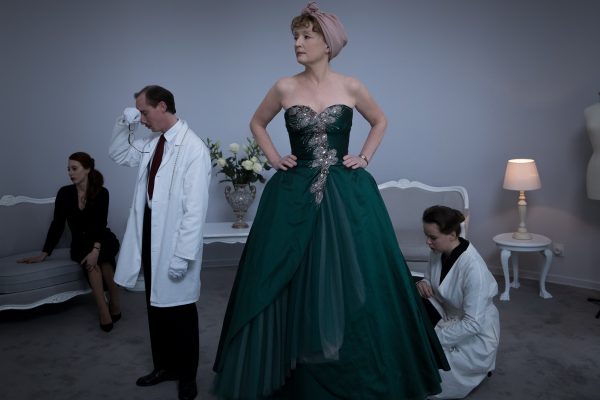
What might at first glance seem like a wispy bit of comedic fluff actually serves up more substance than expected, all dressed up in a deliciously charming package. Based on the 1958 novel by author Paul Gallico, writer-director Anthony Fabian’s third narrative feature tells the fantasy-like tale of a widowed working class English cleaning woman who, through a series of remarkable synchronicities, gets her chance to live her dreams. But, while on an impromptu trip to Paris, she becomes the beneficiary of much, much more as a result of a number of wondrous, magical experiences that “inadvertently” give her and others what’s needed – and what’s wished for. This engaging, uplifting tale thus waxes reminiscent of other films like this, such as the delightful offering “Under the Tuscan Sun” (2003). While the picture’s pacing could use some shoring up in the first act, the film nevertheless delivers solidly thereafter, with moments of triumph, bittersweet romance and heart-tugging joy. Credit the fine ensemble cast for making it all work, especially protagonist Lesley Manville and her persnickety and wickedly funny foil Isabelle Huppert. Then there are the positively gorgeous costumes, which are a feast for the eyes, an achievement that richly deserves to be rewarded come awards season. Indeed, don’t be misled by the seemingly saccharin-encrusted marketing for this one; there’s more to this sweet little charmer than you might think. The film is currently playing in theaters and online.
Wouldn’t it be ideal if we could always make our dreams come true? Given our current level of proficiency at this, we may not yet be adept enough to make that happen, but, considering that many of us think it’s fundamentally impossible, we’ll never make any progress toward that goal until we become at least somewhat practiced at this skill. And, as Mrs. Harris proves, that’s entirely attainable. However, first we must convince ourselves that we can get that far to start with, which itself can be looked upon as a dream capable of being fulfilled. That’s a good place to begin, and, after all, we have to start somewhere. But, if we take that step, there’s no telling where it might ultimately lead us. And wouldn’t that be a dream come true!
Copyright © 2022, by Brent Marchant. All rights reserved.

“The Berrigans: Devout and Dangerous” (2021). Cast: Interviews and Archives: Daniel Berrigan, Philip Berrigan, Elizabeth McAllister, Frida Berrigan, Jerry Berrigan, Kate Berrigan, Daniel Ellsberg, Martin Sheen, Jeremy Scahill, Howard Zinn, John Dear, Jim Forest, Stephen Kelly, Carmen Trotta, Jim Wallis; Voice-overs: Liam Neeson, Bill Pullman. Director: Susan Hagedorn. Web site. Trailer.
Sticking to one’s principles is undeniably a noble pursuit. Walking one’s talk is indeed to be commended for its honesty and integrity. But living up to that aspiration can be quite the challenge, especially when one adheres to an outlook that draws the ire of others, particularly those in positions of power. However, if an impactful statement is to be made, following this course is essential, despite the dangers and difficulties, as seen in the inspiring new documentary about a trio of committed activists seeing through on their mission, “The Berrigans: Devout and Dangerous.”
In the 1960s, the US was embroiled in a highly controversial conflict in Southeast Asia, one that divided the nation into two camps – devoted patriots and vocal opponents. This division came as something of a surprise, given that, in virtually all of the country’s previous wars, Americans had typically gone along with the party line without question. However, Vietnam was a different story. With the conflict being brought home into family living rooms on a nightly basis thanks to television coverage, ostensibly the first time a war had been reported on in such a manner, viewers bore witness to the carnage firsthand in a way that they never had before, and it didn’t sit well with many citizens, including those who considered themselves loyal patriots. They simply couldn’t understand the reasoning behind this war in a faraway land, one that was costing the lives of many young men who were being involuntarily sent off to fight for principles and purposes that were anything but clear. And the vague explanations regularly offered by officials, such as the US being present in Vietnam to make the world safe for democracy, just didn’t cut it with many Americans.
Thus opposition was born, and it only grew stronger as the death tolls rose and the prospect of “winning” the conflict became increasingly murky. Cries of “What are we doing there?” emerged and became commonplace. But, as frustrated as many Americans were becoming, they also wondered what they could do about it. How could they make a meaningful difference? That’s when activism took root.
Drawing upon their experience in the civil rights movement of the early ʼ60s, the growing ranks of anti-war advocates began stepping up and using many of the tactics employed in their earlier endeavors. These acts of civil disobedience were designed to get the attention of the government and the public to protest the insanity of the Vietnam conflict. But, given how entrenched the US had become in the war, anti-war activities needed to be intensified. It also called for leaders who would serve as symbols of the movement and what it stood for. And that’s where three unlikely figures entered the picture.
Roman Catholic priests Philip and Daniel Berrigan, along with nun Elizabeth McAllister, took center stage in the anti-war movement. They were not alone in this by any means, but the audacity of this trio’s measures surpassed those of virtually anyone else. They engaged in activities that many considering shocking, such as the destruction of public draft records, vandalism of the offices of corporations supplying the war effort and deliberate tax evasion. And they made little attempt to hide what they were doing. They earned the scorn of the FBI, with Daniel being the first priest ever named to the agency’s most-wanted list, a stunning counterpoint to the brothers being featured on the cover of Time magazine in 1971. Their anti-war activism subsequently (and frequently) landed them in prison for various infractions with sentences of differing lengths.
In later years, the Berrigans became involved in other activities, such as the founding of the Plowshares movement, an initiative aimed at drawing attention to the madness of nuclear arms. This undertaking included vandalism at a nuclear missile manufacturing facility in Pennsylvania, where they damaged nose cones and poured blood on documents and files. And, thereafter, the brothers became outspoken opponents to the government’s lack of compassion in its handling of the early days of the AIDS crisis. They even took on their own religious organization, with Philip and McAllister breaking their vows of celibacy and marrying in open defiance of the Church, a move that got them excommunicated.
Given the trio’s history of extreme antagonism, one might wonder how committed religious figures could become involved in such ventures. However, as they openly preached and wrote, they believed it was their duty to call out those who defied the ways of peace and the teachings of Christ. To do less on their part would mean that they were falling short of their calling. Some labeled them hypocrites for engaging in acts of violence that went against these very principles, but others applauded them for speaking up and drawing attention to the atrocities of officials who unhesitatingly sanctioned such brutality.
Good cases could be made for both points of view. However, as Americans look back on the war, nuclear escalation and the initial mishandling of the AIDS epidemic, many wonder how these events could have been allowed to occur as they did in the first place. It took courageous voices to make the public aware of what was happening on these fronts, people who were willing to put themselves, their lives and their futures on the line for the sake of their principles. There’s no telling where we might be today if they hadn’t said something, especially when so many others weren’t willing to do so, no matter how sincerely they may have felt about these issues.
As this film’s title suggests, the Berrigans truly were seen as dangerous for their activities. At the same time, though, no one could realistically question their devotion to their causes. And, considering how events played out in the wake of their activism, we should give serious thought to how we label them. For all we know, we could have been saddled with these issues far longer and with more dire consequences than we actually were if they hadn’t raised their voices. Now who could realistically take issue with that?
Given their acts and deeds, the Berrigans and their followers truly walked their talk, operating with integrity, honesty and sincerity, all in line with their true selves. Their lives mirrored the beliefs they held dearly in their hearts, and that resulted in the reality they experienced, for those notions shaped what emerged. Such is the nature of the conscious creation process, the philosophy that maintains we manifest our existence based on these intangible resources. It’s not clear whether they had ever heard of or studied this school of thought, but it’s obvious from what they created that they were masters of its principles, successfully bringing into being materializations in line with what they genuinely believed.
This is verified through many interviews with those who knew the Berrigans and/or their work, such as journalist Jeremy Scahill; historian/philosopher Howard Zinn; actor/activist Martin Sheen; Pentagon Papers whistleblower Daniel Ellsberg; activists/theologians/pacifists John Dear, Jim Forest, Stephen Kelly, Carmen Trotta and Jim Wallis; and the children of McAllister and Philip Berrigan, Frida, Jerry and Kate. These witnesses to history offer fitting tributes to their devoted peers and the changes they helped implement through their courageous, thoughtful work, all of which, simply enough, began with their commitment to their convictions.
A number of important qualities permeated their beliefs in helping to bring their manifestations into being. For example, their staunch fearlessness in the face of significant, oppressive opposition played a pivotal role in enabling them to carry out their daring plans. They refused to let apprehensions stand in their way, regardless of whether or not they were present at the time they launched into their ventures. The same could be said where limitations potentially stood in their way; they wouldn’t allow them to keep them from moving forward, no matter how formidable they might be.
Because of the success they achieved and the attention they generated, the Berrigans attracted a large number of followers. In addition to those noted above, they also won over the support of other activists, particularly among college students, proponents who had much at stake given their draft eligibility and the likelihood of being sent into the very conflict they were protesting against. By pooling their energies and putting them collectively behind mutual beliefs, they brought opposition to the war to the forefront of the American public, pressuring officials to bring it to an end as soon as possible. This is an excellent example of collaborative co-creation at work in which inspired souls work together to achieve a mutually sought outcome.
But, as the Berrigans themselves frequently and freely acknowledged, they saw their work as their destiny. This is a practice that conscious creators better know as value fulfillment, the concept associated with being our best, truest selves for the betterment of ourselves and those around us. And, considering the causes the Berrigans got behind, who could find fault with them for trying to bring about results aimed at curing the world of unnecessary and unspeakable ills? Anyone who believes to the contrary should take a good, hard look at his or her beliefs and wonder why such atrocities would be considered acceptable.
In times of war and great social challenges, it can be difficult to remain devoted to one’s principles – no matter how strongly one feels about them – when prevailing circumstances threaten to curtail our freedoms and our ability to express our feelings about them. Yet there are courageous, unflappable individuals who refuse to let such conditions stop them, as evidenced by this superb documentary. Director Susan Hagedorn chronicles the efforts of these anti-war advocates who refused to remain silent. Through a wealth of archive materials and recent interviews with those who knew or worked with the Berrigans and McAllister, these three activists brilliantly come to life, both as advocates for their causes and as compassionate, committed individuals, all captured in a highly personal way. This material is supplemented with voiceover narrations of the brothers’ writings read by Liam Neeson and Bill Pullman, adding an intimate and thoughtful dimension to their portrayals. We owe much to these virtuous champions, and this eminently moving film makes that abundantly clear.
Unfortunately, finding this film may take some effort at the moment, as it has primarily been playing in special screenings and at film festivals, such as the St. Louis International Film Festival, where it won the Interfaith Award for best documentary feature. Nevertheless, this truly is a film worth seeing, especially for fans of 20th Century American history and those who value bravery and the merits of social conscience.
Stepping forward to address issues of significant social and political importance is critical to the health and well-being of a nation. When we lose sight of that, we stand to lose a lot, both from a practical standpoint and in the soul of a society. It’s at times like that when we need heroic individuals to stand up and point out where we’ve gone wrong, and thankfully we’ve had courageous figures like the Berrigans to do just that. They weren’t afraid to show us the errors of our ways and to take steps to help put us back on the right path. We truly need more advocates like them when we’re at critical junctures in our history.
Do we have any volunteers?
Copyright © 2021-2022, by Brent Marchant. All rights reserved.

“Inversion” (“Varoonegi”) (2016). Cast: Sahar Dowlatshahi, Ali Mosaffa, Alireza Aghakhani, Setareh Pesyani, Roya Javidnia, Shirin Yazdanbaksh, Setareh Hosseini, Toofan Mehrdadian, Payam Yazdani, Ebad Karimi, Mojitaba Nam Nabat. Director: Behnam Behzadi. Screenplay: Behnam Behzadi. Web site. Trailer.
It goes without saying that we’d all like to be treated fairly and equally. However, no matter how much praise and value we may laud on these concepts, there are countless instances where these principles are compromised or disregarded altogether, leaving some of us out in the cold. And, in the wake of such developments, it’s entirely understandable how those who are slighted come to feel angry, frustrated and desperate, placing them in a position of wanting to lash out for justice. So it is for a young Iranian woman in the 2016 domestic drama, “Inversion” (“Varoonegi”), now available for streaming.
Niloofar Pirasteh (Sahar Dowlatshahi) would seem to have a fairly good life going for her. The responsible, self-reliant, unmarried career woman enjoys what appears to be a fulfilling existence in Tehran, despite the challenges of modern urban living. She runs the tailoring business founded by her late father and, with the aid of her good friend, Soudabeh (Setareh Pesyani). is now looking to expand it with a team of seamstresses. Niloo resides in a small but comfortable apartment with her elderly mother, Mahin (Shirin Yazdanbaksh), a kindly old soul who adores her caring, thoughtful daughter and the attention she provides. She’s also close to her teenage niece, Saba (Setareh Hosseini), who looks up to her auntie as a model of a modern woman. And, on top of all that, quite recently Niloo has begun dating Soheil (Alireza Aghakhani), the owner of a construction business who is the apparent epitome of a perfect gentleman. Who could ask for anything more?
However, before long, circumstances begin to change, and not for the better. Tehran’s infamous smog problem has been exacerbated by hot weather, creating an air quality issue that has curtailed outdoor activities and closed schools. It’s also made for a health crisis that can potentially harm those with respiratory issues, such as Mahin. And, in fact, that’s precisely what happens when she ventures outside without her oxygen, causing her to collapse with difficulty breathing. She’s rushed to the hospital and placed in intensive care, where, fortunately, the staff is able to successfully stabilize her condition.
In the wake of this emergency, Niloo and her family gather at the hospital to check on the patient. In addition to Saba, Niloo is joined by her elder siblings, her brother, Farhad (Ali Mosaffa), and her sister, Homa (Roya Javidnia), along with her brother-in-law, Mojid (Toofan Mehrdadian). They meet with Mahin’s doctor (Payam Yazdani), who says that Tehran’s air quality issue is severely affecting her health and that she should move to a new locale where debilitating smog is not a problem. But where? And who will accompany her to her new out-of-town home, given that she’s not capable of living on her own?
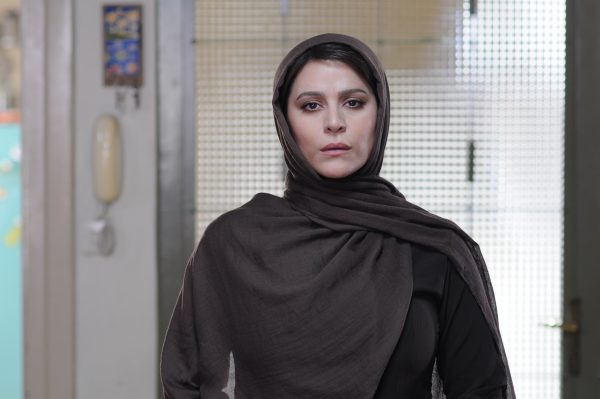
Homa recommends that Mahin should relocate to a vacation home that she and Mojid own in the north of Iran, where the air is cleaner and would be better for the patient’s recovery. Farhad agrees with the idea, and he and Homa decide that Niloo should join Mahin in her new home, a decision they make without asking their sister. They even go so far as to start making financial arrangements for Niloo, considering that she’ll have to give up her business, another decision made on her behalf without her input. But, then, in their view, why should they have to ask for her input? After all, she’s the younger sibling. What’s more, the decision involving Niloo’s forfeiture of her business is seen as benefitting the well-being of the extended family overall, as it will result in the sale of the building in which the tailoring operation is housed, the funds from which Farhad can use to pay off his own delinquent debts. How considerate of – and convenient for – him.
Needless to say, Niloo is not happy with being left out of these decisions. However, in a culture where the men and older siblings are accustomed – even expected – to make decisions for the family, Farhad and Homa figure, why should their younger sister’s opinion matter? But this argument holds no water with Niloo. By relocating, she’ll have to give up her apartment, her business and her budding romance, not to mention the way of life she so readily enjoys in Tehran. What’s more, she’s tired of her family making decisions for her without consultation. It’s become so pervasive in her life that Farhad has even gone so far as to make decisions for Niloo about her own car.
In circumstances like this, Niloo takes comfort in the fact that she can at least count on Soheil to be in her corner. But even that proves to be based on false hope when the allegedly perfect gentleman springs a surprise on her. And, at this point, the only ones who still back her are Saba, Soudabeh and Mahin, but, as emotionally supportive as they all are, there’s little of a practical nature that they can do to help out.
So what is Niloo to do? She decides she’s not willing to roll over and comply with what the others say, especially when they could be doing more to help out, despite their contentions that they have family and financial obligations that keep them from doing so. In response, Niloo offers alternative proposals. She fights back. She even goes so far as to refuse to cooperate with the decisions that have been made for her. But what’s the cost of this behavior, given that such defiant acts are seen as hostile and offensive in a society where they imposed decisions are supposed to be accepted without question?
Just as Tehran’s air quality issues would benefit from a temperature inversion in which the oppressive prevailing hot air is forced upward, allowing cooler atmospheric conditions to settle in to wipe out the smog, Niloo believes she would benefit from a comparable metaphorical change in her own life. The “hot air” that’s been spewn by many of her family members and virtually all of the men in her life has stifled her when it comes to simply being able to live her life her way. Will the conditions present in her existence dissipate? It’s a forecast she would undoubtedly like to see come true.

When others impose themselves on us without our permission or consent, the effect can be maddening. The level of frustration and anger is often staggering. And, when we find ourselves struggling under conditions where it’s difficult to retaliate against, or even to counter, those excessive burdens, those feelings are frequently amplified. Moreover, when such situations are generally accepted – even sanctioned – by cultural norms, these scenarios can become unbearable. So, needless to say, for those who are independently inclined, like Niloo, dealing with such impositions can be utterly exasperating.
However, as vexing as these circumstances can be, we’re often left wondering what to do. Can they be overcome to arrive at a satisfactory outcome? Well, that depends on how readily we believe such situations can be rectified. And that’s important, given that our beliefs determine how our reality unfolds, a product of the conscious creation process, the philosophy that maintains these intangible building blocks shape our existence.
In a case like this, if we wish to attain a result to our satisfaction, we must believe that achieving it is truly possible. If we fail at this, however, we’re likely to be stuck with what’s being foisted on us. So what are we to do?
Understanding the complete range of beliefs involved in situations like this can be a valuable starting point, primarily because they’re seldom black and white. There are many in-between shades that can affect how circumstances unfold. For instance, beliefs associated with doubt can inflict considerable impact on these scenarios. No matter how strongly we may believe that amenable outcomes are attainable, if we allow doubt-based beliefs to figure into the mix, the hoped-for results can evaporate instantaneously. Therefore, isolating and eliminating any beliefs along these lines is imperative. Likewise, if we hold fast to beliefs in fears or limitations on what’s achievable, we’re likely to encounter comparable results. They, too, must be eliminated to get what we want, because, if they hold on, they’ll unduly interfere with the desired outcomes.
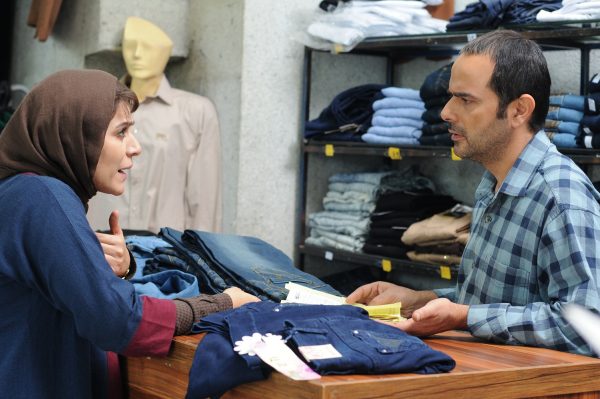
From where Niloo stands, these impediments could easily stand in her way, and there are even times when she seems to give them some credence in terms of how she responds. However, the more these obstructing beliefs attempt to impinge upon her, the more empowered she becomes in sweeping them away, difficult though that may be. She knows what she wants, and she’s determined to get it, especially since what she’s asking for is wholly reasonable.
By contrast, it’s curious to note how Farhad and Homa respond to Niloo’s challenges. They attempt to put up a brave, united front, believing that they’re entirely justified in implementing what they’re doing. But they certainly have their unspoken doubts, too, and they get in the way of them being able to pull off their schemes without hindrances, most notably as a consequence of the challenges put forth by their sister. Farhad and Homa resort to scorn, ridicule and even physical violence to counter Niloo’s arguments, growing increasingly defensive the more they’re openly confronted. And, when they begin to lose the support of Saba and Mahin, they become more desperate, but they also have increasing difficulty hiding their veiled shame. Suddenly the decisions that they saw as perfectly justifiable slam dunks are looking more questionable and in need of some much needed (and equally justifiable) scrutiny.
The ability to employ one’s power of discernment is crucial to this process as well, such as what happens when Soheil springs his surprise on Niloo. Prior to this, he has convincingly portrayed himself as a forthright, impeccably honest perfect gentleman, someone who would seemingly never think of trying to deceive Niloo or railroad her into a misrepresented scheme. He’s so smooth at this that he almost has her fooled, too. But, to her credit, Niloo is able to sense what’s going on before she’s in too deep, and her ability to detect these circumstances before becoming embroiled in them enables her to avoid the same kinds of conditions that her siblings are attempting to inflict on her, even if it’s presented in a more palatable, though nevertheless equally unfair, way.
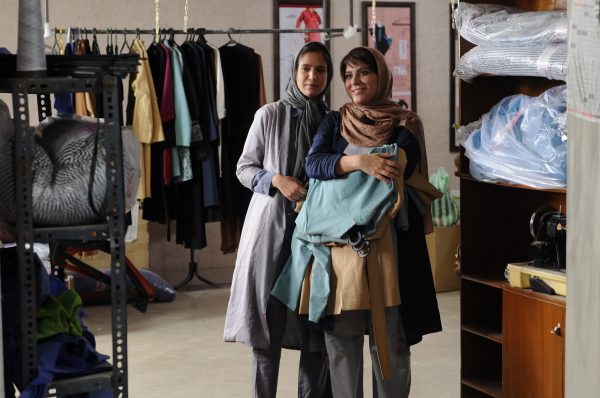
Individual scenarios like the one Niloo faces serve as a vital starting point for initiating the process of changing the culture. The sort of grass roots effort involved in addressing Niloo’s case is akin to planting a seed that has the potential to promote change on a wider cultural scale. And, in a land where women increasingly want to enjoy the same kind of autonomy over their lives as their male counterparts do, these scenarios represent significant developments whose ripple effects could spread outward and be implemented more widely across Iranian society.
Movies that bring these issues to the public’s attention are thus important, for they help to enlighten those in need of hearing their message. As many films from overseas have shown in recent years, such as the recently released Indian offering “Fire in The Mountains,” women around the globe are increasingly tired of the prevailing disparity, standing up for themselves and no longer automatically capitulating to what others want (particularly men) just because they say so or are invoking traditions that are fast falling by the wayside. Matters of fairness and equality deserve to be heard, and pictures like this help to do just that.
Though somber and slow-moving at times, this 2016 domestic drama from Iranian writer-director Behnam Behzadi (now available for streaming) spotlights the one-sided attempts at imposing economic, career and living arrangement decisions on single women by their families, especially those who are married, and by men in particular. Like many films from Iran, the narrative here tends to over-explain things at times, but, in all fairness, this release also successfully resists the temptation to spoon-feed its audiences, relying on showing more than telling to make its points. This Cannes Film Festival nominee for the Un Certain Regard award serves up a story of inspiring assertiveness in the face of unfairly oppressive conditions, a story that’s sure to light a fire under those who feel repressed, making an impassioned case in favor of principles that are, and have long been, noticeably absent. This is truly an uplifting tale for women everywhere who feel needlessly put upon in simply trying to live their lives as they see fit.
When basic considerations like those addressed in this film go ignored, at some point they may emerge in a forceful, perhaps even exaggerated form. Such powerful notions can be denied for only so long before they erupt, no matter how diligently others may try to suppress them. And, for women like Niloo, who have begun to more aggressively assert themselves around the world, we had better listen to what they have to say lest we face circumstances that could be difficult to manage if allowed to manifest uncontrolled. After all, it’s simply the fair thing to do, and who can realistically find fault with that?
Copyright © 2022, by Brent Marchant. All rights reserved.